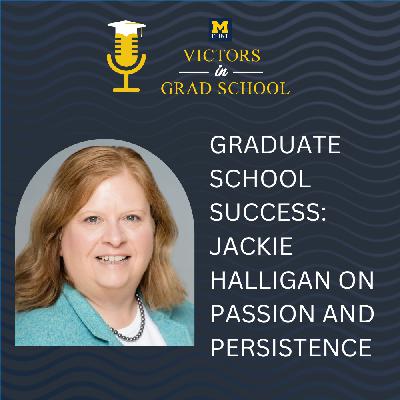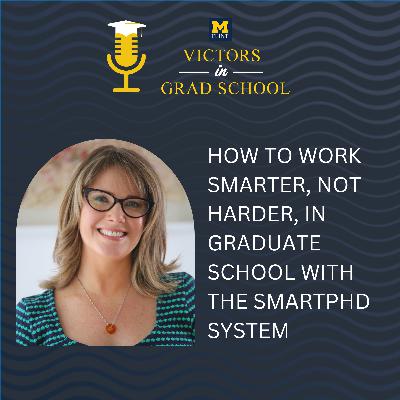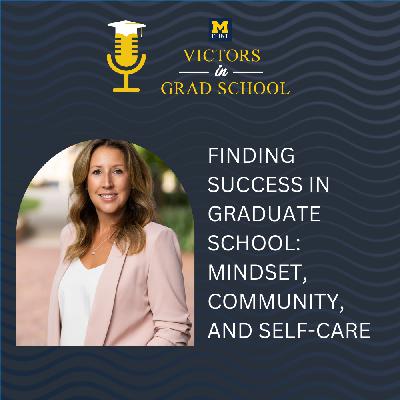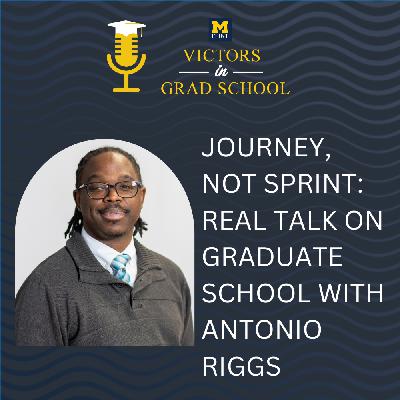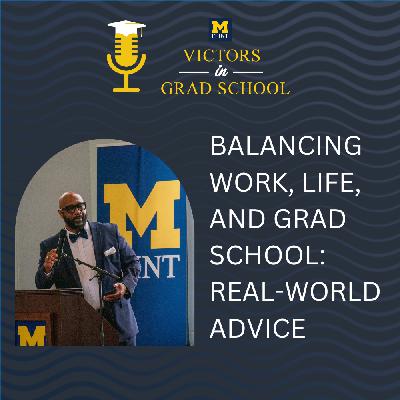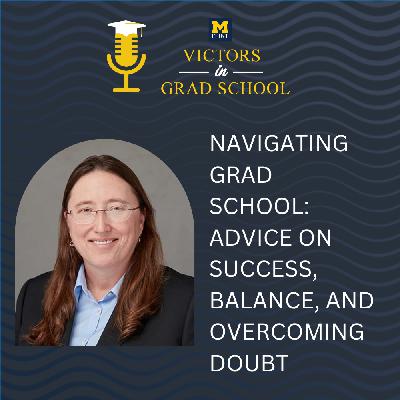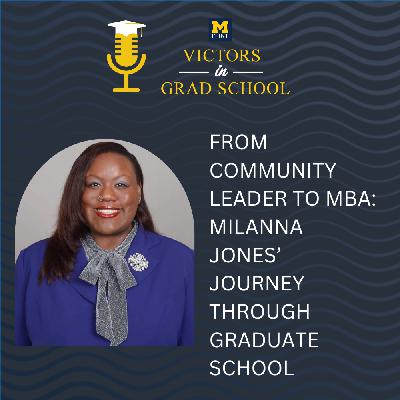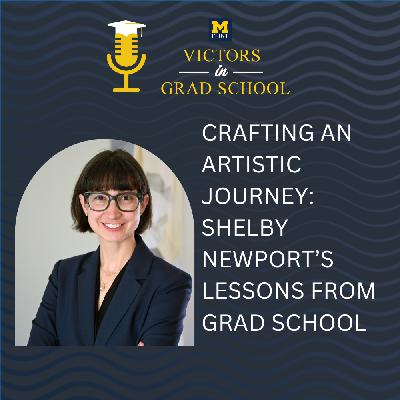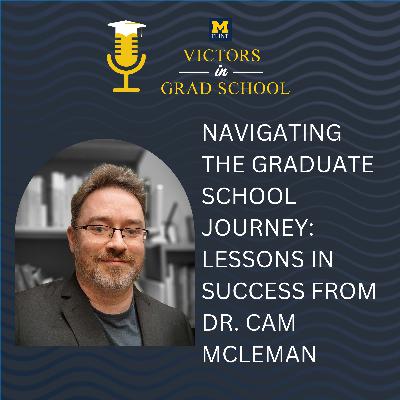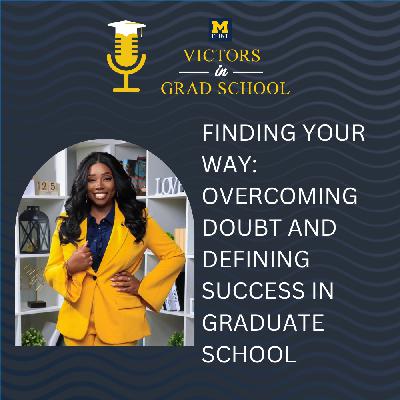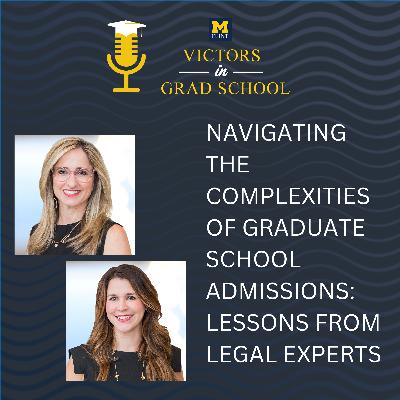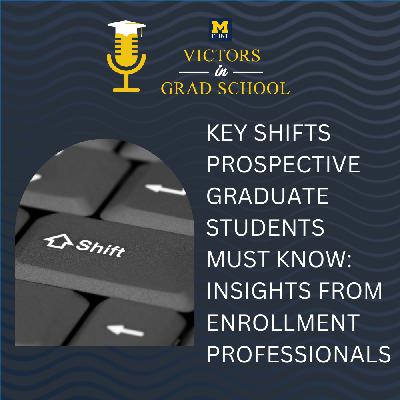Graduate School Success: Jackie Halligan on Passion and Persistence
Description
Are you thinking about graduate school, in the midst of your studies, or reflecting on your own academic journey? If so, the latest episode of the “Victors in Grad School” podcast is one you won’t want to miss! Hosted by Dr. Christopher Lewis, this engaging episode features Jackie Halligan, Human Resources professional at the University of Michigan-Flint, who offers a candid look into her path through academia and into a thriving HR career.
The Journey is Unique for Everyone
Right from the start, Dr. Lewis reminds us: graduate education is a journey, not a race. Jackie’s story perfectly illustrates this. After earning her Bachelor’s in Employee Relations at Michigan State University, she worked in the field before deciding to pursue a master’s degree. What sparked her return to the classroom? Mentorship and practical advice during an undergrad internship made it clear that a graduate degree was the “golden ticket” for advancing in human resources.
Finding the Right Fit
Jackie emphasizes the importance of researching programs to find the best fit. She didn’t simply chase prestige—she sought a university with a top-tier HR program, ultimately returning to Michigan State for her master’s in labor and industrial relations. Her advice to prospective students: visit campuses, explore programs, and choose the environment where you feel most comfortable and supported.
Preparation and Persistence Lead to Success
Jackie credits her undergraduate experience with teaching her how to study, manage time, and persevere through academic challenges—skills that were crucial for succeeding in grad school. She highlights the unique benefits of a smaller graduate cohort, where close relationships with professors and peers created a supportive network.
Applying Graduate Education in the Real World
Throughout her career—in manufacturing and academia—Jackie has leaned on her social science background, which helped her empathize, communicate, and balance employee and company interests. She stresses that passion is more important than chasing a paycheck. Decades into her HR career, she still finds her work deeply rewarding.
Final Advice for Future Graduate Students
Jackie’s overarching message is clear: Find your passion, research your options thoroughly, and set yourself up for success by choosing a graduate program that’s the right fit for you—not just the one with the highest salary prospects.
Eager to learn more and be inspired by Jackie’s story? Listen to the full episode of “Victors in Grad School” and start charting your own path to graduate school success!
TRANSCRIPT
Dr. Christopher Lewis [00:00:01 ]:
Welcome to the Victors in Grad School, where we have conversations with students, alumni and experts about what it takes to find success in graduate school. Welcome back to Victors in Grad School. I'm your host, Dr. Christopher Lewis, Director of Graduate Programs at the University of Michigan, Flint. Really excited to have you back again this week. Every week you and I are on a journey. I say that every week. But it truly is the case that education and the journey, the what you're doing right now, whether you're at the very beginning just starting to think about this, or you're maybe you've already applied and you've gotten accepted, or maybe you're in graduate school, it is a journey.
Dr. Christopher Lewis [00:00:41 ]:
And from the just ideation stage, where you're just thinking about it all the way to the completion stage can take a short period of time, it can take a long period of time. It really is determinant on where you are at your point, at the point in which you are today. And every person is at a different point, and it can take people different amounts of time to be able to get to that education. This podcast is here to be able to help you in that journey. It is here to be able to help you learn about things that you can do to be successful in this process, whether it's applying, whether it's going through graduate school, whatever it may be. I love every week being able to bring you different people with different experiences that have gone through graduate school before you, that can share their own experiences about what worked, maybe what didn't work as well as things that they learned along the way. And today, today we've got another great guest. Jackie Halligan is with us today.
Dr. Christopher Lewis [00:01:40 ]:
And Jacqui works at the University of Michigan Flint in the Human Resources office. And she has her own education journey that led her not only into professional work, but also to the University of Michigan ultimately over the last few years that she's been here. So I'm really excited to be able to talk with her today, to learn from her and to have you learn from her experiences as well. Jackie, thanks so much for being here.
Jackie Halligan [00:02:04 ]:
I'm excited. Thank you, Chris, for the invitation. I appreciate.
Dr. Christopher Lewis [00:02:08 ]:
Well, it is definitely my pleasure and I'm excited to be able to talk to you today. And as I said, it is a journey that everyone goes on when they go and make a decision to go to graduate school. And I know that you did your undergraduate work at Michigan State University, you got a Bachelor of Arts in Employee Relations and then you went off, you worked for a little Bit of time there, there was a point, but there had to have been a point in time, whether it was during undergraduate work, whether it was during that, when you were working, where you said to yourself, I need to keep going. I need to get some more education to get to where I want to be. Can you bring me back in time and talk to me about that period, that point, and what was the spark that made you make that decision?
Jackie Halligan [00:02:55 ]:
So if I go back actually to my undergraduate experience, I did two internships, one of which was at the city of Flint, actually in their labor relations department. And the director of labor relations at that time was getting his master's from Michigan State in labor relations. And his advice to me was that human resources is a very. Now, this was a while ago, but human resources is a very difficult field to break into. And that he felt it was important to get a master's degree to really be able to work in the field and have a good job. And he said to me, but once you get your master's degree, you'll be set, you'll have a great career, you'll do well for yourself. But it really is kind of like the, you know, the entry ticket, the golden ticket, as they call it, that to get a good start and get a good career in human resources. And so obviously, these number of years later, that's something that still resonates with me and certainly was a piece of the very important puzzle for me to consider graduate school.
Dr. Christopher Lewis [00:03:51 ]:
I know that ultimately you made the decision to go back to Michigan State to get a master's degree in labor and industrial relations. And there are many programs that are out there. You could have selected any of those programs. So as you were working and just making those decisions about where you wanted to go, what you wanted to do to be able to make that next step. Talk to me about that decision making process for yourself and what made you ultimately decide that Michigan State was the place where you wanted to go?
Jackie Halligan [00:04:24 ]:
So I was probably a little bit different than other people in high school. I knew what I wanted to do. Probably a senior. I mean, it wasn't like I was a freshman, but probably by when I was a senior and I was looking at programs, I actually came across what at the time was gmi, which is now Kettering, they had a labor relations program. And I was researching and reading about it and just that was it. Like it just clicked and it made sense. And so when I started to really think about going into undergrad and wanting to study labor relations or human resources at that Time there weren't a lot of HR programs that you could get a degree in. And Michigan State was actually one of the top, still is one of the top schools in the country.
Jackie Halligan [00:05:04 ]:
You can get a human resources management or labor relations degree. And so I knew going into school, even as a freshman, that's what I was going to study. I, I've done it now for decades, quite frankly, I've never wavered from wanting to work in hr. So I just sort of did my research, found that Michigan State was one of the best universities at that time in the country to study this. And that's where I went.
Dr. Christopher Lewis [00:05:27 ]:
Simple as that. And the thing that is interesting is I think that, as you said, you may be a little unique because not every student knows that they want to do human resources right from the get go as they go into college. And as you go through, through college, as you go through your undergrad, you move into your graduate degree, there is a different way in which you are educated, different expectations, different perspectives, different ways of learning. And you were successful in going through that graduate work and then going back out into the world after that and taking that knowledge into the workplace. Every individual has to find their path for themselves. They have to find the way in which that they can be successful in that transition, not only into graduate school

